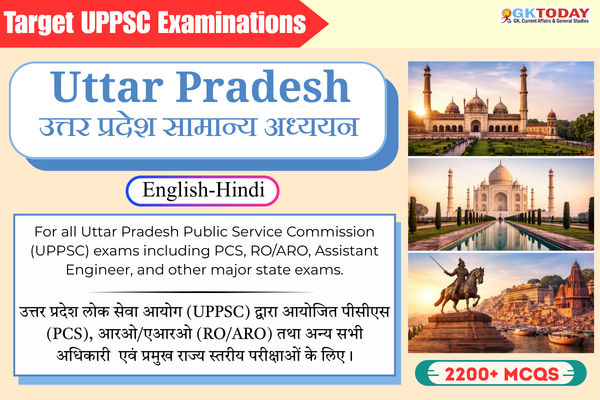1. Recently, where were the sandstone replicas of the Konark wheel installed?
[A] India Gate
[B] Red Fort
[C] Rashtrapati Bhavan
[D] Parliament House
Show Answer
Correct Answer: C [Rashtrapati Bhavan ]
Notes:
Four sandstone replicas of the Konark wheel were installed at the Rashtrapati Bhavan Cultural Centre and Amrit Udyan.
This installation promotes India’s rich cultural heritage to visitors. The Konark Sun Temple, a UNESCO World Heritage Site, represents Odisha’s temple architecture and is designed as a giant chariot for the Sun god. The Konark wheel symbolizes India’s cultural legacy and architectural excellence.
2. What technology was used to detect the lost Mayan city hidden in the Mexican forest?
[A] GPS
[B] LiDAR
[C] Sonar
[D] MRI
Show Answer
Correct Answer: B [LiDAR]
Notes:
Scientists have discovered a lost Mayan city in the dense Mexican jungle using LiDAR technology. LiDAR stands for Light Detection and Ranging and is a remote sensing method that uses pulsed lasers to measure distances to the Earth’s surface. It can create high-resolution 3-D models of ground elevation with vertical accuracy of up to 10 cm. The LiDAR system includes a laser, scanner, and GPS receiver. The laser fires rapidly, hitting surfaces like vegetation and buildings, with the reflected light recorded by the sensor.
3. Which ministry is responsible for conducting the census in India?
[A] Ministry of Health and Family Welfare
[B] Ministry of Tourism
[C] Ministry of Defence
[D] Ministry of Home Affairs
Show Answer
Correct Answer: D [Ministry of Home Affairs]
Notes:
The government plans to conduct the Census in 2025, widely welcomed for its policy-shaping role since 1872. Census 2025 will include key initiatives like potential caste enumeration, pending government approval. It will also assist in electoral delimitation and help create the National Population Register (NPR). The Census captures essential demographic, economic, and socio-political trends in India. The Ministry of Home Affairs is responsible for conducting the census in India. The Office of the Registrar General and Census Commissioner of India is responsible for planning, implementing, and conceiving the census. The Directorate of Census Operations in each state and union territory (UT) is responsible for conducting the census in their respective jurisdictions.
4. What is Gastrodia lohitensis, that was recently seen in news?
[A] Fish
[B] Orchid species
[C] Butterfly
[D] Spider
Show Answer
Correct Answer: B [Orchid species]
Notes:
Indian botanists have discovered a new leafless orchid species, Gastrodia lohitensis, in Arunachal Pradesh’s Lohit district. This orchid thrives in bamboo thickets around Tezu, relying on nutrients from fungi in decomposing leaf litter instead of sunlight. The discovery was led by Krishna Chowlu from the Botanical Survey of India during a May 2024 expedition. Gastrodia lohitensis stands 50-110 cm tall and has unique features, including linear calli and ridges on its flower lip. It is classified as “Endangered” due to threats from local land use, emphasizing the need for habitat protection in this biodiverse area.
5. What kind of disorder is Obstructive Sleep Apnea (OSA) that was recently seen in news?
[A] A rare neurological disorder
[B] A type of sleep-related breathing disorder
[C] An autoimmune disease
[D] A digestive disorder
Show Answer
Correct Answer: B [A type of sleep-related breathing disorder]
Notes:
Obstructive sleep apnea (OSA) is linked to a higher risk of dementia, especially in women, as shown by a study of over 18,500 adults. OSA is the most common sleep-related breathing disorder where breathing repeatedly stops and starts during sleep due to an airway blockage. This disruption in breathing lowers oxygen levels, causing frequent awakenings and poor sleep quality. Symptoms include snoring and fatigue, with risks increasing in middle-aged and older adults. OSA affects cardiovascular health, mental well-being, and safety. Treatments include positive airway pressure devices, mouthpieces, and surgery in some cases.
6. Gobind Sagar Lake, which was seen in the news, is located in which state?
[A] Gujarat
[B] Punjab
[C] Himachal Pradesh
[D] Haryana
Show Answer
Correct Answer: C [Himachal Pradesh]
Notes:
The Himachal Chief Minister recently launched water sports activities at Gobind Sagar Lake. Gobind Sagar Lake is a manmade reservoir in the Una and Bilaspur districts of Himachal Pradesh. Named after Guru Gobind Singh, it is fed by the Bhakra Dam on the Sutlej River. The Bhakra Dam is one of the highest gravity dams in the world, standing 225.5 m tall. The lake is 90 km long, covers about 170 sq. km, and has a maximum depth of 163.07 m, making it one of the deepest artificial lakes. It supplies irrigation water to Himachal Pradesh, Punjab, Haryana, and Rajasthan, benefiting regional agriculture.
7. Recently, the External Affairs Minister of India inaugurated India’s new Consulate General in which city of Australia?
[A] Brisbane
[B] Melbourne
[C] Perth
[D] Sydney
Show Answer
Correct Answer: A [Brisbane]
Notes:
India’s new consulate in Brisbane, Australia, was inaugurated by External Affairs Minister S Jaishankar. The consulate marks a milestone in India-Australia relations, strengthened by recent trade deals. Queensland, home to about 100,000 of Australia’s nearly one million Indian-origin residents, is key to these ties, with India as its second-largest export market. India also has consulates in Melbourne, Perth, and Sydney. The Brisbane consulate will be led by diplomat Neetu Bhagotia, who has prior experience in India’s missions in Bhutan and Russia.
8. Abhay Prabhavana Museum, a largest museum of ideas dedicated to Jain philosophy, recently inaugurated in which city?
[A] Pune
[B] Indore
[C] Visakhapatnam
[D] Varanasi
Show Answer
Correct Answer: A [Pune]
Notes:
Union Minister Nitin Gadkari inaugurated the Abhay Prabhavana Museum in Pune, India’s largest museum dedicated to Jain philosophy and heritage. Set on 50 acres along the Indrayani river, it features 30 galleries showcasing the essence of Jain philosophy through interactive exhibits, artworks, and advanced technology. The museum aims to attract over 2,000 visitors daily and will include a separate children’s section to simplify complex concepts, making it a global cultural landmark.
9. Tanushree Pandey has clinched which medal at the World Soft Tennis Championship at Jingshan in China?
[A] Gold
[B] Silver
[C] Bronze
[D] None of the Above
Show Answer
Correct Answer: B [Silver]
Notes:
India’s Tanushree Pandey won a silver medal at the World Soft Tennis Championship in Jingshan, China. She narrowly lost the Under-21 Women’s Singles final to Chiang Min Yu of Chinese Taipei, with a score of 3-4. In the semifinal, Tanushree won a close match against her Japanese opponent, 4-3. She also defeated a Chinese player in the quarterfinal with the same scoreline of 4-3.
10. What was the theme of the third edition of the MAHASAGAR event conducted by the Indian Navy in November 2024?
[A] Training Cooperation to Mitigate Common Maritime Security Challenges in IOR
[B] Blue Economy and Regional Development
[C] Collective Maritime Approach towards Countering Common Challenges
[D] Maritime Security and Trade
Show Answer
Correct Answer: A [Training Cooperation to Mitigate Common Maritime Security Challenges in IOR]
Notes:
The third edition of the virtual interaction MAHASAGAR took place on 5 Nov 2024, led by Admiral Dinesh Kumar Tripathi, Chief of the Naval Staff. It involved leaders from maritime agencies of Indian Ocean Region (IOR) countries, including Bangladesh, Seychelles, Sri Lanka, and others. The theme was “Training Cooperation to Mitigate Common Maritime Security Challenges in IOR,” focusing on improving training collaboration. MAHASAGAR is a bi-annual Indian Navy initiative, launched in 2023, aimed at enhancing security and growth through maritime cooperation and capacity building.


